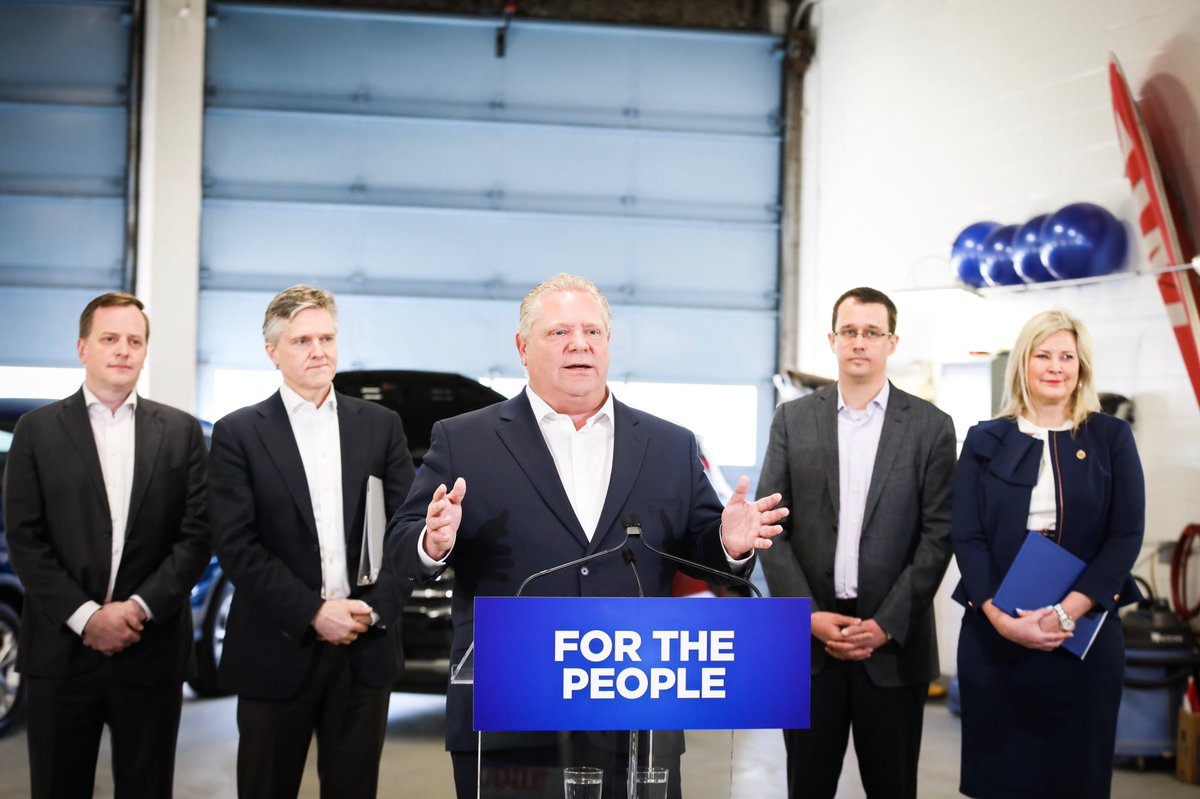
TORONTO — Canada’s most populous province and the federal government engaged in a pitched battle for public opinion over the carbon tax as it launched Monday, just six months ahead of the federal election.
Ontario is one of four provinces, including Manitoba, Saskatchewan and New Brunswick, where Ottawa imposed the levy because they opted not to impose their own pricing schemes on carbon emissions.
Prime Minister Justin Trudeau framed the move as a win for the environment, tweeting that “it’s no longer free to pollute anywhere in Canada.” But Ontario Premier Doug Ford took the opportunity Monday, as drivers started paying about 4.4 cents a litre more for gas, to hammer his populist, anti-carbon tax message.
“By the time the federal government is done, the average household will have to pay $648 a year more in carbon tax expenses,” Ford said at a news conference celebrating the end of a vehicle emissions testing program.
“That may not seem a lot of money for lobbyists or activists and economists who designed the carbon tax for the federal Liberals, but it sure is a lot of money to the seniors, the truckers, the waitresses, the hardworking people I meet everywhere I go across this province.”
Ford, whose government is fighting the tax in court later this month, was citing the expected cost to a typical household by 2022, while this year it is expected to be $258.
Residents of provinces with the tax will be getting rebates on their income tax returns that start at $128 annually and increase for people with spouses or dependents at home. The federal government says a family of four in Ontario would get $307 this year.
While Ford said he is staying out of the federal election, he took pains to brand the carbon pricing scheme as the “Trudeau Liberal carbon tax” and cast doubt on Ottawa’s promises.
“Nobody trusts the federal government when they cross their fingers and they say they will eventually — eventually, that’s the magical word — eventually give money back to us,” said Ford, whose Progressive Conservatives cancelled a cap-and-trade program introduced by the former Liberal government after taking power last year.
“The prime minister tells us that the carbon tax will be good for us, but then I sit back and say, ‘Really? Why should anybody believe what he says anymore?”’
Ford’s comments came after he and his caucus flooded Twitter with photos of themselves at gas stations Sunday, warning that it was the last chance to fill up before the carbon tax took effect.
The federal government is launching its own social media campaign to push the carbon price and related income tax rebates, complete with planted questions for Environment Minister Catherine McKenna to answer, in both official languages, extolling the virtues of the carbon pricing plan.
She also posted a video from former California governor Arnold Schwarzenegger with the hashtag “#terminatingclimatechange.”
Schwarzenegger, a Republican, was governor as California prepared to introduce a cap-and-trade system though he left office about a year before it was implemented in 2012. In a video McKenna posted on Twitter, he praises Canada’s price on pollution and says all the anti-carbon price rhetoric Canada is hearing today, he heard a decade ago.
“We have heard all of this dialogue here in California, that the economy is going to come to an end, people are going to lose their jobs,” he said. “None of it came true.”
McKenna, meanwhile, dismissed Ford’s contention that the carbon price could lead to a recession as “irresponsible political rhetoric.”
She said putting a price on pollution and providing a rebate to consumers is a “small c conservative approach” to addressing climate change that gives consumers a choice to invest in ways to curb their energy use or pay more to maintain the status quo. She pointed to the work of Nobel Prize-winning U.S. economist Paul Romer who strongly backs a carbon price as the best way to curb pollution.
The federal tax is $20 a tonne for this year and is set to increase by $10 annually until it reaches $50 a tonne in April 2022. In addition to increasing gas prices, it will add about four cents to a cubic metre of natural gas, and also drives up the cost of propane, butane and aviation fuel.
Ottawa has yet to reveal details about a program to rebate some of the increased costs faced by small- and medium-sized businesses.
Saskatchewan, which is also challenging the tax in court, says it has amended regulations so the PST won’t be charged on the carbon tax on SaskPower bills.
“Even as our government is fighting this harmful tax in court, the federal government is imposing their carbon tax on Saskatchewan families, communities and businesses,” said Premier Scott Moe said.
New Brunswick is an intervener in Saskatchewan and Ontario’s court challenges.
“This carbon tax is like a very bad April Fool’s joke,” Environment Minister Jeff Carr said in a statement.
Manitoba Premier Brian Pallister also criticized the tax, saying Ottawa would be taking money away from households.
“This is unfortunate and also demonstrates a lack of listening and willingness to co-operate,” he said.
In Alberta, United Conservative Leader Jason Kenney has already pledged to axe the provincial carbon tax and said if he wins the province’s election, a court challenge of the federal carbon tax will be launched by the end of the month.
— with files from Mia Rabson, Steve Lambert and Chris Purdy.